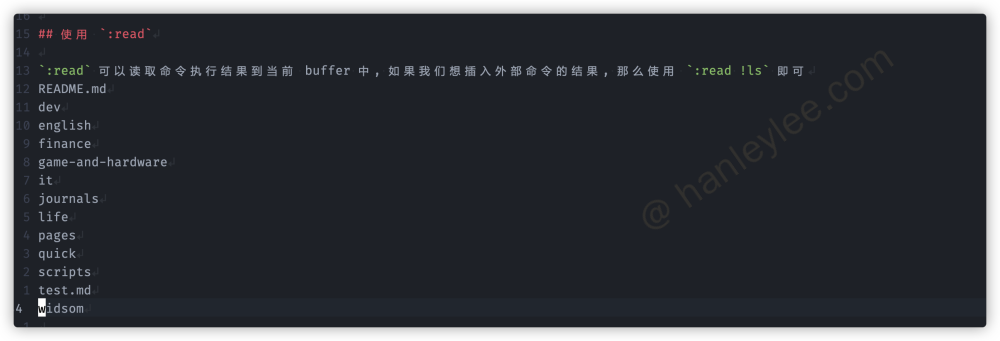在 vim 中我们可以用添加前缀 ! 的方式执行外部命令, 例如 !ls, 其结果将被在底部输出

那么我们如果想使用外部命令的结果, 该怎么做呢?
使用 :read
:read 可以读取命令执行结果到当前 buffer 中, 如果我们想插入外部命令的结果, 那么使用 :read !ls 即可

使用 system()
如果我们不想将一个命令的执行结果插入当前 buffer 中, 有没有办法可以保存在变量中呢? 也是有的, vim 提供了函数 system() 用来获得输出外部命令的结果, 如果你使用过 shell 的话就会知道, 这种使用方式就像使用 $(command) 或 `command` 一样. 在脚本中我们使用 let var = system("command") 的形式了获得输出结果
在终端中我们可以通过 $? 来得到上一个命令的执行结果, 根据此结果来判断是否继续执行还是终止程序. 在 vim 中我们也可以按照相同的思路去思考, 使用预设变量 v:shell_error 可以获得最近一个外部命令的执行结果
如下是一个综合使用 system() 与 v:shell_error 的例子
" Swap between target path and source path
function! hl#chezmoi#swap_between_target_and_source()
let current_path = expand('%:p')
if current_path =~# '.local/share/chezmoi/' " current path is located in ~/.local/share/chezmoi/, now we are inside the source path
let target_path = s:get_target_file(current_path)
exec 'edit ' . target_path
else " now we are in the target path, so we should check this file have corresponding source file or not
let target_path = system('chezmoi source-path ' . current_path)
if v:shell_error != 0
echom 'Current file is not managed by chezmoi!!!'
else
exec 'edit ' . target_path
endif
endif
endfunction
实际案例
Redir
我们可以定义一个方法用来捕获 vim 内部命令或外部命令的输出, 将捕获的结果输出到一个新窗口中
"`:Redir` followed by either shell or vim command
command! -nargs=+ -complete=command Redir silent call Redir(<q-args>)
" Redirect output to a single window
function! Redir(cmd)
for win in range(1, winnr(’$’))
if getwinvar(win, ‘scratch’)
execute win . ‘windo close’
endif
endfor
if a:cmd =~ ‘^!’
let output = system(matchstr(a:cmd, ‘^!\zs.*’))
else
redir => output
execute a:cmd
redir END
endif
botright vnew
let w:scratch = 1
setlocal buftype=nofile bufhidden=wipe nobuflisted noswapfile nowrap
call setline(1, split(output, “\n”))
endfunction
GetOutput
同样, 我们可以仅仅将结果返回, 这在脚本中对变量赋值非常有用, 更加灵活, 使用方法为 let var1 = GetOutput("!python --version")
" Get output of a command
function! GetOutput(cmd)
if a:cmd =~ '^!'
let output = system(matchstr(a:cmd, '^!\zs.*'))
else
redir => output
silent execute a:cmd
redir END
endif
let output = substitute(output, '[\x0]', '', 'g')
return output
endfunction